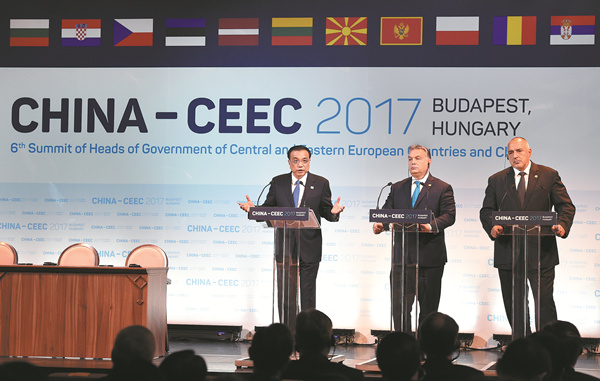’16+1′ invigorates China-Europe ties
By Zhang Ming (China Daily)
 |
|
Premier Li Keqiang addresses an economic forum attended by 16 Central and Eastern European leaders on Monday in Budapest. Hungarian Prime Minister Orban Viktor (center) and Bulgarian Premier Boyko Borisov also spoke. ATTILA KISBENEDEK / AFP
|
The 6th meeting of heads of government between China and Central and Eastern European Countries in Budapest is proof that cooperation between China and the 16 CEE countries has grown from strength to strength and matured over the past five years, marked by a number of early harvests in the areas of trade, investment, infrastructure, finance, education, tourism and people-to-people exchanges. The “16+1” cooperation mechanism has delivered benefits to all the countries involved, highlighting China-Europe cooperation as a whole.
Since I arrived in Brussels, the headquarters of the European Union-in fact, even before that-I have heard some concerns expressed about the “16+1” cooperation mechanism. Some have even misunderstood it as China’s “divide and rule” tactics against the EU. However, such concerns and misunderstanding are totally unfounded if one looks at why China chose to initiate the “16+1″cooperation mechanism in the first place and how China has gone about it ever since.
China has always been a supporter of European integration. Its position has been clear-cut and consistent. To divide the EU is not in China’s interest. As President Xi Jinping put it, “16+1″cooperation is an important part of and useful complement to the China-EU comprehensive strategic partnership, and can play a role in promoting China-EU partnerships for peace, growth, reform and civilization.
The”16+1″ cooperation mechanism is transparent, open and inclusive. China welcomes the EU and other relevant economies to participate in regional and global development, and has invited the EU to take part in many such activities under the”16+1″ framework as an observer.
China respects EU laws and regulations. Also, the EU member states have participated in”16+1″ cooperation in accordance with EU laws and policies.
China firmly supports the European integration process, and wants to see a united EU, a prosperous Europe, and a stable euro. In fact, these have been backed by China’s concrete actions.
The”16+1″ cooperation mechanism and China-Europe cooperation are interconnected. And China-Europe cooperation provides a solid foundation for the”16+1″ cooperation mechanism. As China and Europe work together to synergize the Belt and Road Initiative and the Investment Plan for Europe, as well as development strategies of European countries, the CEE countries will play a more prominent role as a hub connecting Asia and Europe.
The”16+1” cooperation mechanism could serve as a new engine of China-Europe cooperation, too. In promoting”16+1″cooperation, we are exploring new areas, approaches and practices in the light of the industrial features and development needs of the CEE countries. In doing so, China-Europe cooperation has been significantly broadened and deepened. Without “16+1″cooperation, China-Europe relations would not have been so productive and successful.
The”16+1” cooperation mechanism is conducted on the basis of equality and mutual benefit. It benefits the CEE countries by diversifying and complementing their existing trade routes and sources of investment and financing. It benefits all the participants by promoting economic development and livelihoods through concrete projects. The past years have seen tangible outcomes of “16+1” cooperation-the Budapest-Belgrade railway, the 16+1 financial holding company, the 16+1 inter-bank consortium, to name just a few. The “16+1” cooperation mechanism also benefits the EU, and Europe as a whole, as faster development in the CEE countries contributes to more balanced development across Europe and boosts European integration.
I am confident that the”16+1″meeting in Budapest will produce even more fruitful results. The “16+1″cooperation mechanism is a creative framework which enables countries in different regions and with different social systems to work together. It goes hand in hand with China-Europe cooperation and constantly injects new vigor into such cooperation. With that, China, the CEE countries and the EU will become better off together.
The author is ambassador extraordinary and plenipotentiary and head of mission of the People’s Republic of China to the European Union.












